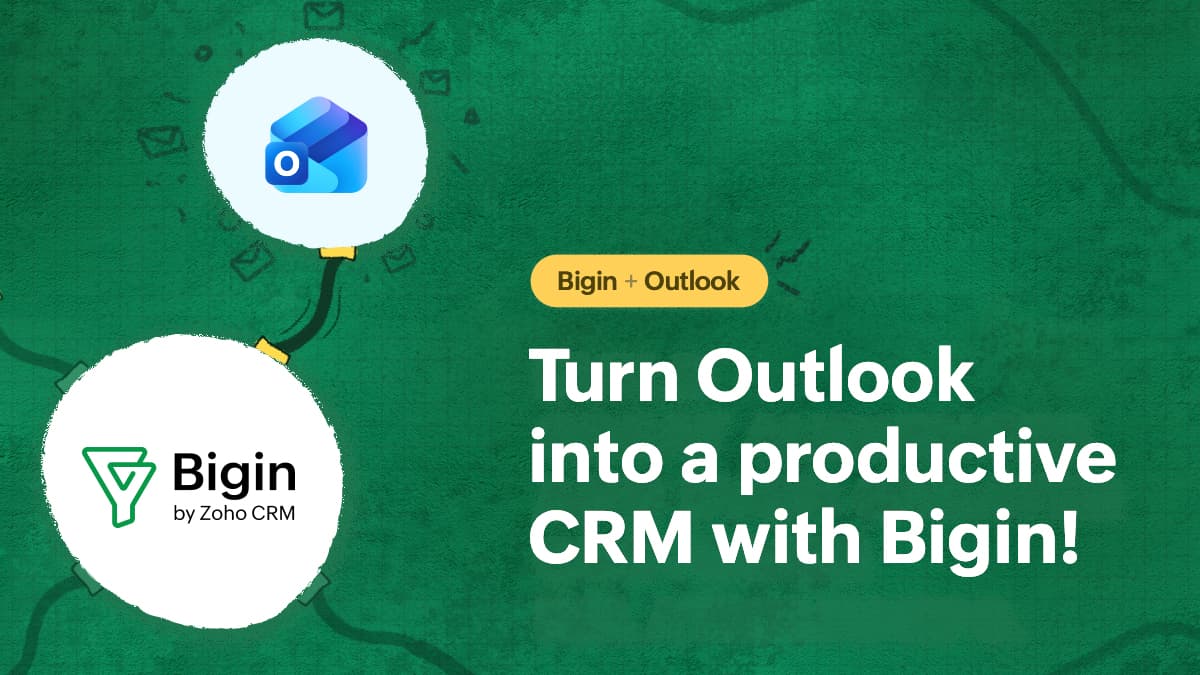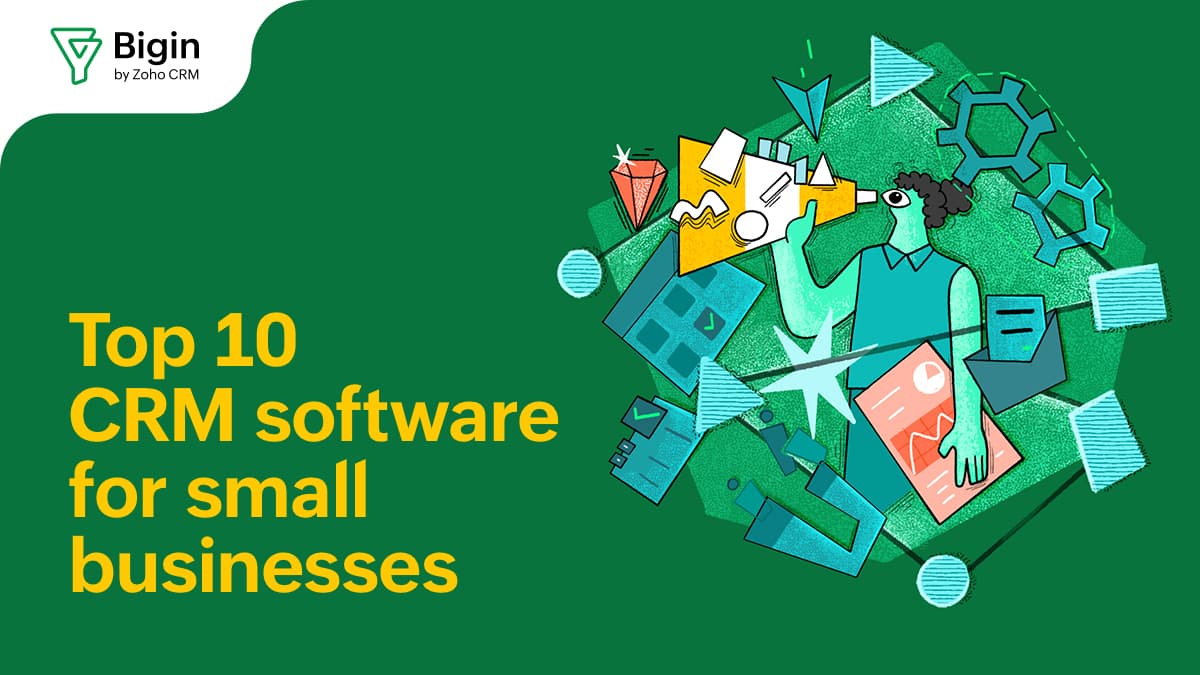- HOME
- Entrepreneurship
- The transformative benefits of switching to a CRM tailored for small businesses
The transformative benefits of switching to a CRM tailored for small businesses
- Published : June 4, 2024
- Last Updated : October 15, 2024
- 1.4K Views
- 6 Min Read

As a small business owner, you're no stranger to the importance of staying organized and efficient. Chances are you already use one of the popular CRM solutions in the market. But do you use the right kind of CRM for your needs?
Take a moment to ponder over these questions: Does your CRM truly address your small business challenges? Does it ever incorporate your feature requests into the product? Would we be accurate in saying that your CRM focuses more on meeting the needs of larger organizations?
The reality is that many small businesses use CRMs designed for large organizations, which is akin to trying to fit a square peg into a round hole—or like putting a jet engine on a Toyota Camry; it doesn't make sense.
These CRMs are packed with sophisticated features that small businesses rarely have any use for. If anything, it complicates things and leads to a poor user experience. And that's why it's crucial you find a CRM that addresses your specific small business requirements.
You see, a well-implemented small business CRM is more than just a database; it's an asset that can drive tangible results for your small business.

That's why it's super important that you don't implement just any software, but a solution that's built for businesses like yours; a solution that understands the inner workings of small businesses.
But what do these benefits look like? What should small business owners like yourself expect? In this article, we'll go over the benefits of switching to a CRM designed for small businesses.
1. Elevated customer experience
Personalized service Personalization is everywhere. Big organizations spend a lot of resources on creating personalized experiences. But what about small businesses, where resources are scarce and bandwidth is low?
That's where small business CRMs are useful. These CRMs are designed to be economical and efficient, and to enable you to store detailed customer information such as preferences, purchase histories, and communication records.
The best part? You don't have to do the grunt work.
Providing your customers with this level of personalization shows them that you value and understand them, and makes it more likely they'll become repeat customers.
Proactive customer care: Most small business CRMs have the ability to track customer interactions, purchases, and milestones. You can use these insights to proactively reach out with personalized offers, follow-ups, or support at the right time.
It's also a great way to predict customer concerns even before they arise. Think about the superior experience you can provide with this level of attentiveness and anticipation of customer needs. It will set your business apart from the competition.
2. User experience tailored for small teams
User interface: A good small business CRM offers a simple, intuitive interface that ensures quick adoption and minimal disruption to daily operations for small teams with limited resources. Long implementation cycles and complex training processes just aren't practical.
Flexible pricing: Small business CRMs typically offer flexible and affordable pricing plans that match the budgets of smaller organizations.
This sort of pricing empathy is usually lacking in enterprise grade CRMs. If you're a small business owner and come across a CRM that doesn't offer affordable and flexible pricing options, we recommend you stay far away from it.
Mobile-friendly: Sales executives are often on the move. Any small business CRM worth its salt provides a mobile app that enables you to access customer data, update records, and respond to inquiries on the go.
The nature of small business operations dictates that neither you nor your employees can be expected to be at your desks all the time—especially when you have 100 different things to fix. You should avoid CRMs that don't recognize this.
3 . Improved data quality and accessibility
Consolidated data: We know how painful it is to track visibility across different data sources. Small business CRMs like Bigin collect customer data from different sources and store it in a centralized hub.
This eliminates data silos and ensures your team members have access to accurate and up-to-date information.
Data hygiene: If you have a well-designed small business CRM in your tech stack, you won't have to worry about duplicate records and inconsistent information. The best small business CRMs have built-in data validation and deduplication features that keep your customer data clean, consistent, and error-free.
Businesses waste a lot of bandwidth on keeping customer data clean, and small business CRMs help you save that time.
Integrations: Most small business CRMs integrate with the tools you already use, including email clients, invoicing software, workspace tools, e-commerce platforms, and more.
This means you can focus on what matters most—growing your business—rather than juggling multiple systems.
4. Streamlined workflows
Automation: Small business CRMs like Bigin can automate your routine and manual tasks, such as sending follow-up emails, scheduling appointments, setting reminders, and updating lead statuses. This saves small teams valuable time that they can dedicate to growth-driving activities.
Pipeline management: Losing a hot lead due to a lack of follow-up is frustrating. Your sales team understands this pain. That's why you need a visual sales pipeline tool within your small business CRM to track leads, opportunities, and deals from initial contact to closure. This ensures no prospect slips through the cracks.
Unique workflows: Customizable workflows and processes in small business CRMs are adaptable to the unique needs and operations of small businesses and thereby eliminate the need for a one-size-fits-all approach.
5. Insight generation through analytics
Custom reporting: Custom reporting capabilities enable you to build your own reports tailored to your specific needs, and often include pre-built report templates focused on common small business KPIs.
These can be used out of the box or customized as needed, and the analytics can provide actionable insights that enable you to make informed, data-driven decisions.
Easy to generate: User-friendly custom reporting capabilities within small business CRMs enable you you to create tailored reports and analyze data without having advanced technical skills or external support. This promotes a culture of self-service analytics and data-driven decision-making.
6. Fostering a culture of collaboration
Transparency: CRMs designed for large organizations have data spread across multiple modules. It's almost impossible for every team member to have visibility over all the relevant data points in order to generate insights.
Small business CRMs fix this issue by providing every team member with a single view of all relevant customer data. When all team members have visibility into customer interactions, it boosts transparency and accountability within your organization.
Shared knowledge: Think of a CRM as a centralized knowledge base. Your team members have access to and can share customer information, best practices, insights, and trends, which other team members can learn from. This promotes a collaborative and supportive environment.
Consistent customer experience: Thanks to how small business CRMs are built, all your team members have the know-how to provide consistent and exceptional customer experiences, irrespective of who interacts with the client.
You're probably thinking that this small business CRM thing sounds too good to be true. But it is true, and you stand to gain a lot by switching to one. It can transform the way your small business interacts with customers.
The time you save on micromanaging different aspects of customer relationship management will give you a massive advantage; you'll have the bandwidth to focus on more high-level aspects of your business, things that determine the long-term growth trajectory of your business. And that's priceless. A small business CRM like Bigin can make this a reality.
 A more expansive and inclusive CRM solution
A more expansive and inclusive CRM solution
At Bigin, we work with one goal in mind: to help small businesses eliminate the challenges they face in their day-to-day work.
And with Bigin, you don't need to worry about a steep learning curve or a complicated onboarding process; it's a simple small business CRM that you can set up in 30 minutes.
Not convinced yet? Why don't you give us a try? Sign up for our free trial. We promise you won't regret it!
 Anubhav
AnubhavAnubhav is a product marketer with an insatiable thirst for all things content marketing, technology, and SaaS. His expertise lies in crafting compelling narratives that resonate with audiences and drive business growth. With a deep-rooted interest in entrepreneurship, Anubhav closely follows the latest industry trends and innovations, constantly seeking new ways to elevate marketing strategies.



